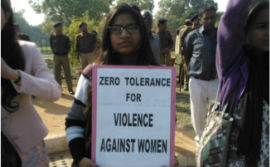Caritas India says capital punishment is not a deterent against crimes of sexual violence, but improved protection for women and a national school curriculum that tackle these issues will help.
Last month, a 23-year-old student died of her injuries after being raped in the capital Delhi. Five men have been charged with her murder and are facing trial. If convicted, they face the death penalty.
In recommendations to the Justice J.S. Verma Committee, formed by the government to recommend safety measures for women, Caritas India urged for curriculums from school levels onwards to tackle the issue of violenece and abuse agaisnt women and girls.
“The need of the hour is to revolutionize our thinking through education,” said Patrick Hansda, a young public relations officer at Caritas India.
The Verma committee’s recommendations in less than a month from now will be considered in amending laws for speedier justice and punishment in sexual assault cases in India.
Other recommendation included setting up of special fast track courts with women lawyers and women welfare committees at district level, anti-sexual harassment task forces composed of 60 percent of women at Panchayat (local) level, a higher rank of police officers handling rape and sexual crimes, a national toll free women helpline and CCTV cameras with emergency phones in public spaces.
Caritas India Executive Director, Fr. Frederick D’Souza said that death penalty is only elimination of the offender and not the crime.
Fr. Frederick however suggested stringent punishment should be enforced but with the scope for personal change and transformation. He also called on the collective responsibility of the society and state to have adequate systems and policies in place to deter crime and protect life and dignity of a human person.
“God is the author of life and no human being has the right to do away with the life of any human person”, said the Assistant Executive Director, Fr Paul Moonjely.
Clarifying his stand, Fr Paul believes that for a civilized society, it is essential to think of civilized means in treating criminals. Criminals are made and criminality is perpetrated in the society for various reasons. If people are dangerous they should be confined and refined through appropriate measures and legal enforcements.
Explaining violence against women and children especially girls, Team Leader for Caritas India Gender Programmes, Ms Shimray said it is partly a result of relations that assumes boys and men to be superior to women and girls. Given the subordinate status of women and girls, much of the violence is considered normal and enjoys social sanction.

